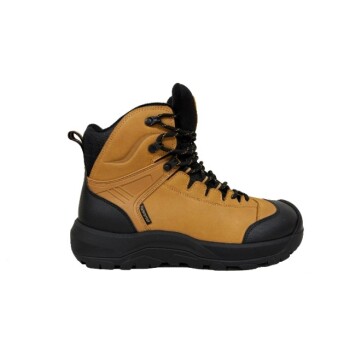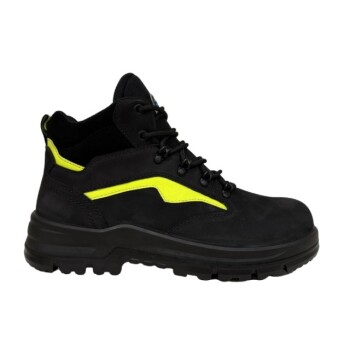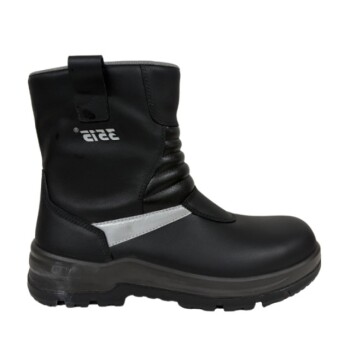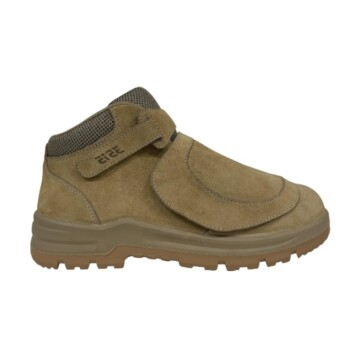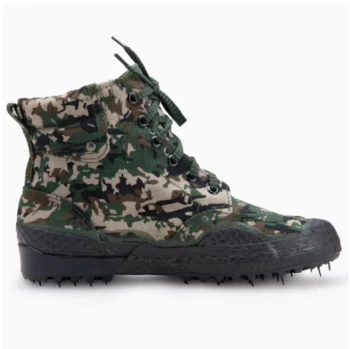In short, the primary advantages of rubber soles in safety boots are their exceptional slip resistance, waterproofing, and durability against chemicals and oils. They are specifically engineered to provide reliable traction and protection in harsh, unpredictable, and often wet working environments where other sole materials may fall short.
The core reason to choose rubber soles is not for a single feature, but for their comprehensive resilience. They offer a unique combination of grip, impermeability, and durability that ensures a higher degree of safety and reliability in challenging industrial, agricultural, and outdoor conditions.
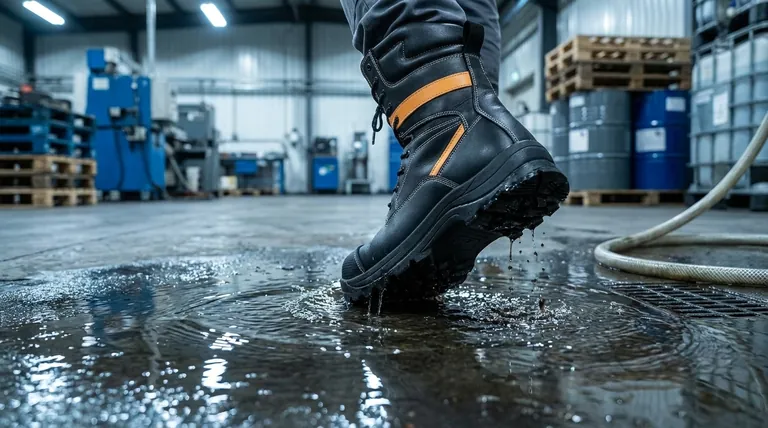
The Foundation of Safety: Grip and Stability
For any safety boot, the point of contact with the ground is the most critical safety feature. This is where rubber's inherent properties provide a distinct advantage.
Superior Slip Resistance
The molecular structure of rubber provides a high coefficient of friction. This translates directly to superior grip and traction on a wide range of surfaces.
Rubber soles are particularly effective on wet, oily, or uneven terrain, significantly reducing the risk of slips and falls, which are among the most common workplace accidents.
Excellent Flexibility and Ground Feel
Natural and synthetic rubber compounds maintain excellent flexibility. This allows the sole to conform to the ground's surface, maximizing contact and enhancing stability.
This flexibility also contributes to comfort by allowing for a more natural foot movement, reducing fatigue over long shifts.
Unmatched Environmental Protection
Beyond grip, a safety boot must shield the wearer from environmental hazards. Rubber's composition makes it an ideal barrier material.
Absolute Waterproofing
Unlike materials that are merely "water-resistant," vulcanized rubber is 100% waterproof. This ensures feet remain completely dry in standing water, mud, or heavy rain.
This impermeability is crucial for preventing discomfort, fungal infections, and potential frostbite in cold, wet conditions.
High Chemical and Oil Resistance
Many work environments involve exposure to corrosive or slick substances. Rubber can be formulated to resist degradation from a wide range of oils, acids, and industrial chemicals.
This not only protects the wearer but also preserves the structural integrity of the boot sole, preventing premature failure.
Durability and Shock Absorption
Rubber is inherently tough and resistant to wear and tear. This durability ensures the sole maintains its protective qualities for longer, even in abrasive environments.
Additionally, rubber has natural shock-absorbing properties, which help to dissipate impact energy and reduce stress on the feet, ankles, and knees.
Understanding the Trade-offs
No material is perfect for every application. To make an informed decision, it's critical to understand the potential trade-offs associated with rubber soles.
Weight Considerations
High-density rubber soles can be heavier than some synthetic alternatives like polyurethane (PU) or EVA foam. While this weight often correlates with durability, it can be a factor in causing fatigue for workers who cover long distances on foot.
Temperature Sensitivity
While excellent for wet conditions, standard rubber soles can become stiff and less flexible in extreme cold. They also may not provide the same level of thermal insulation as specialized compounds unless specifically designed for cold-weather applications.
Abrasion vs. Grip
There is a trade-off between the hardness of the rubber (for abrasion resistance) and its softness (for grip). A very hard, durable rubber may offer slightly less traction on smooth, wet surfaces than a softer, stickier compound that might wear out more quickly.
Making the Right Choice for Your Goal
Your specific work environment should dictate your material choice. Rubber soles are the superior option when protection and grip are non-negotiable.
- If your primary focus is working in wet, muddy, or chemical-heavy environments: Rubber is the definitive choice due to its absolute waterproofing and chemical resistance.
- If your primary focus is maximum slip resistance on oily or varied surfaces: The high coefficient of friction in rubber makes it the safest and most reliable option.
- If your primary focus is general-purpose durability on abrasive surfaces: A harder rubber compound offers excellent longevity, though you may be trading a small amount of grip.
Ultimately, choosing a rubber sole is an investment in uncompromising safety and environmental protection.
Summary Table:
| Advantage | Key Benefit | Ideal For |
|---|---|---|
| Slip Resistance | Superior grip on wet, oily, and uneven surfaces | Industrial floors, kitchens, outdoor work |
| Waterproofing | 100% impermeable, keeping feet dry | Wet environments, standing water, mud |
| Chemical/Oil Resistance | Resists degradation from harsh substances | Manufacturing, chemical plants, workshops |
| Durability | Long-lasting performance in abrasive conditions | Construction, mining, agriculture |
Need reliable safety boots with superior rubber soles for your team?
As a large-scale manufacturer, 3515 produces a comprehensive range of footwear for distributors, brand owners, and bulk clients. Our production capabilities encompass all types of safety shoes and boots, including those with advanced rubber sole technology designed for maximum protection and comfort.
We can help you equip your workforce with durable, high-performance safety footwear tailored to your specific environmental challenges. Contact our experts today to discuss your requirements and get a quote!
Visual Guide
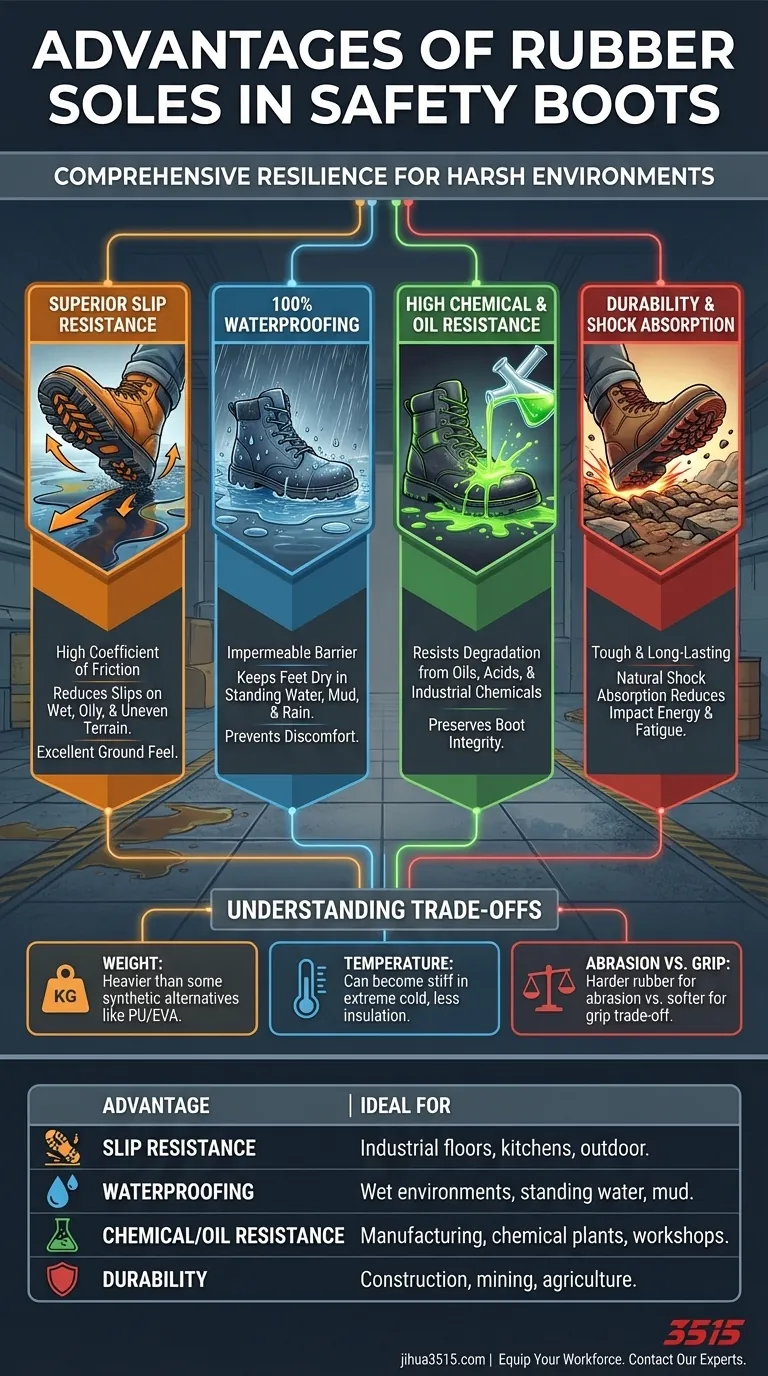
Related Products
- Premium Flame-Retardant Waterproof Safety Boots and Shoes
- Safety Footwear Wholesale Manufacturer for Custom OEM/ODM Production
- Factory-Direct Wholesale Canvas Boots with High-Traction Rubber Soles
- Premium Insulated Safety Boots and Shoes for Wholesale & Bulk Orders
- Wholesale Premium Waterproof Nubuck Safety Shoes Boots
People Also Ask
- What specific protective features are required for safety shoes in high-temperature rotary kiln maintenance areas?
- What do the symbols on safety footwear indicate? A Guide to Decoding Boot Safety Ratings
- Why is it necessary to equip operators with professional safety shoes in a flour milling workshop? Prevent Slip Hazards
- What workplace hazards do safety toe boots protect against? Comprehensive Protection Guide
- What were some early hazards that safety footwear addressed? A Guide to Essential Foot Protection



